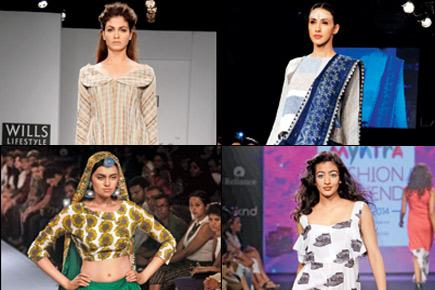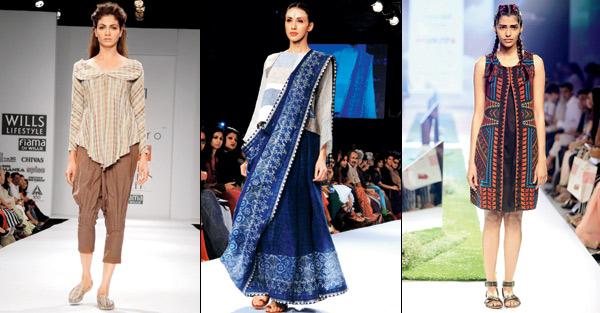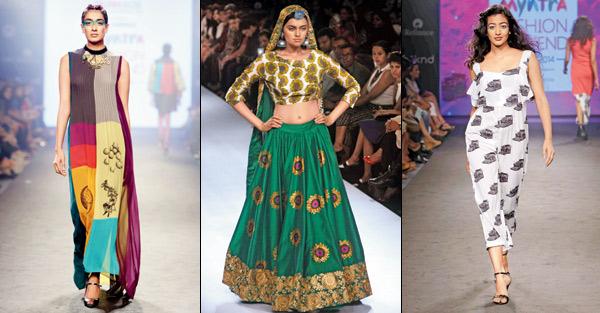Over the last 14 years, fashion weeks have been the toast of the fashion circuit, But in the recent past, fashion weekends, where customers can buy the goods off the racks without any prior bookings, are gaining prominence. How do retailers, designers and organisers react to these ticketed concepts of fashion weeks, which are a popular phenomenon globally?

Fashion
Change is the only constant in life. This quote by famous Greek philosopher Heraclitus is a universal truth that pervades all aspects of our lives. Not surprising, this applies to the fashion industry too where trends change rapidly and what was in vogue yesterday is passé today. In such a scenario, fashion weeks have played a crucial role by serving as a platform for designers to showcase their creations, connect with retailers and keep a tab on latest trends ruling the runway.

A model in Gaurav Jai Gupta’s creation and (right) in Anavila Misra’s creation at Lakme Fashion Week Winter/Festive 2014. Same designs were shown at Sahachari Foundation’s exhibition. A model in Anita Dongre’s Global Desi creation at the Myntra Fashion Weekend (MFW) this month
Since 2000, when fashion weeks started in New Delhi, there has been a blitz of similar ones across the country. From a five-day fashion week held once a year, the event progressed to two for the Spring/Summer and Autumn/Winter seasons each year by Wills India Fashion Week (WIFW). While these two seasons catered to fashion buyers who booked six months in advance to be a part of these events, a new genre of fashion weeks started by Lakmé Fashion Week (LFW) in 2010 catered to the immediate seasons called Winter/Festive (W/F) and Summer/Resort (S/R). This enabled retailers to buy the collections off the ramp or place quick orders for the following weeks.
ADVERTISEMENT

A model in a Quirkbox creation at MFW. Quirkbox had shown the same collection at LFW W/F 2014, A model sports a Yogesh Chaudhari creation of Surendri at LFW W/F 2014, A model sports a Masaba Gupta creation, which was presented by fashion portal Stylista.com at MFW
Over the last two years, a new trend has emerged wherein fashion weekends, more like exhibitions, are held where customers can buy the goods off the racks without any prior bookings. The Myntra Fashion Weekend (MFW), which was held from October 3-5, was a ticketed event aimed at the B2C (business to consumer) side of business. Organised by Myntra.com and IMG Reliance, it catered to the former’s online buyers who could come in direct contact with designers and brands.
In September this year, the Sahachari Foundation held a two-day exhibition sale, titled Amazing Yards, where designers Gaurav Jai Gupta (label Akaaro), Anavila Misra (label Anavila) and Sanjay Garg (label Raw Mango) showcased the same creations that they had displayed in LFW W/F 2014. Last November, eight designers, including four Indian designers — Nachiket Barve, Swapnil Shinde, Falguni and Shane and Drashta Sarvaiya — participated in the Signature International Fashion Weekend.
So how do retailers, designers and organisers react to these short-term exhibitions or rather ticketed concepts of fashion weeks, which are a popular phenomenon globally? Are designers interested in quick sales instead of consignment terms that most retailers work on?
Sunday mid-day finds out:
An innovative concept
Saket Dhankar, head fashion, IMG Reliance, explains that it’s the right time to introduce fashion weekends, which have three types of runway shows — trend shows, designer shows and brand shows — to customers. “A fashion week is a trade event for industry professionals and store buyers who are registered and invited. MFW is a consumer-focused ticketed event that uses the same exhibition and runway venue as a week with designers; but here the public can shop. Fifteen years ago, IMG/Lakmé changed the fashion scenario with a fashion week. Now it’s time to introduce the fashion weekend format
for consumers.”
Chief Creative Officer of Myntra.com, Gautam Katamraju, reiterates the move was initiated to democratise fashion for the masses. “We organised MFW as the concept is doing well in Zurich, Sydney and London, where it was organised by IMG. This was an attempt to reach out to consumers with the latest trends and curated shows. We are expanding the ways we interact with consumers through such events. The after-effects are very good in terms of sales and we will have more editions in Mumbai,” he says.
Designer speak
Irrespective of whether they are showcasing at fashion weeks or weekends, designers are laughing all the way to the bank. These events help them expand their clientele, retailers and clients, in equal measure. National Award winner Anju Modi says, “Fashion weekends are a great way for us to connect with clients, their aspirations and don’t affect our business with retailers.” Gupta, who showcased at Sahachari Foundation’s exhibition as well as LFW, says exhibitions give designers instant feedback that helps them improve their creations. He elaborates, “We had a good response at LFW W/F 2014 and we are booked till the beginning of 2015 but at Sahachari Foundation’s event, I could sell my creations directly to customers and get instant feedback.”
“We have showcased designs at LFW for years but MFW was a new experience in the realm of digital business. We are a young brand so it was important for us to engage with our customers as it helps us understand them better with their feedback,” reveal Yogesh Chaudhary of Surendri and Karishma Shahani Khan of Ka-Sha, who repeated their LFW W/F 2014 collections at MFW.
Be it trade shows, exhibitions, pop-up shops or trunk shows, Anita Dongre feels all of them help generate visibility for high-street brands. According to Dongre, who has participated in LFW and retails her apparel on Myntra.com, e-commerce is a rapidly growing retail tool. “But we are selective in choosing our e-retail partners to maintain equity,” she says.
Avinash Chhabria, CEO, Stylista.com, presented Masaba, Monica Dogra and Shivan-Narresh collections at MFW in spite of having a dedicated e-commerce site for these designers. He believes this move won’t hamper his brand’s prospects. “It was an experiment to understand how consumers react to our products via a live show/exhibition. In fact, it will give consumers confidence to shop online once they’ve seen our products personally,” he says.
Designers also believe that the market is huge and retailers don’t have to feel threatened if they showcase their same collection at different events. Rixi Bhathia and Jayesh Sachdev of Quirkbox, who showcased at LFW and MFW say, “We aren’t worried about the retailers who placed orders with us at LFW W/F 2014 being upset for selling the same collection at MFW. There is a huge appetite for retail and a percentage of consumers who love shopping at exhibitions.” When it came to the cost factor of the apparels, there was no fluctuation between LFW and MFW as most designers work on an MRP system.
Nachiket Barve is one of the few designers who participated in WIFW SS 2014, Pune Fashion Week 2013 and Signature International Fashion Weekend 2013 both in November 2013 and showed the same collection everywhere. “WIFW is the main B2B industry event and there is no replacement for it. Pune Fashion Week had a different audience. Signature International Fashion Weekend was a B2C event without retailing. I would take part in a fashion weekend with an auxiliary collection aimed at selling and not disturb my retailers who have booked for delivery six months in advance.”
Retailers react
How do retailers feel about fashion weekends, after placing orders a month ago at LFW with designers whose collections may not have arrived on the racks yet?
“A fashion weekend is not for retailers or buyers. We are a premium store and won’t place orders if designers are going to sell at exhibitions. These fashion weekends may affect some retailers, but we work on MRP tags and not cost price,” declares Falguni Jhaveri of Fuel who is unable to understand the concept of a fashion portal having exhibitions and sales.
“It is contradicting their e-commerce concept, which should habituate customers to buy online without seeing or feeling the garments. They could do shows to create awareness for their brands but not have an exhibition or sale,” she adds.
Jhaveri, however, feels that seasons in fashion weeks are not working in India as 70 percent of collections are bridal or evening wear. “There are just a few designers such as Rohit Bal, Anamika Khanna, Rana Gill, Rohit Gandhi and Rahul Khanna who follow the two seasons concept with their collections. The rest make several collections throughout the year.” So the choice is either waiting for a few months to get the latest creations in the stores or rush to fashion weekends/exhibitions, to pick up designer wear. Both concepts are likely to exist as they are consumer driven but the weekend format seems more favoured by organisers, designers and consumers.
 Subscribe today by clicking the link and stay updated with the latest news!" Click here!
Subscribe today by clicking the link and stay updated with the latest news!" Click here!







